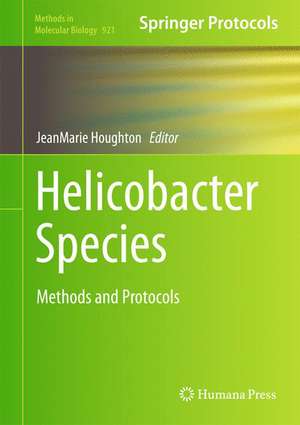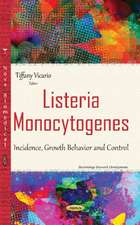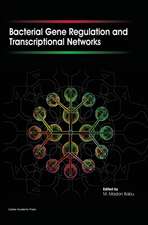Helicobacter Species: Methods and Protocols: Methods in Molecular Biology, cartea 921
Editat de Jeanmarie Houghtonen Limba Engleză Hardback – 27 sep 2012
Authoritative and practical, Helicobacter Species: Methods and Protocols seeks to aid scientists in further study of this crucially important research into Helicobacter research.
| Toate formatele și edițiile | Preț | Express |
|---|---|---|
| Paperback (1) | 698.80 lei 6-8 săpt. | |
| Humana Press Inc. – 23 aug 2016 | 698.80 lei 6-8 săpt. | |
| Hardback (1) | 953.65 lei 6-8 săpt. | |
| Humana Press Inc. – 27 sep 2012 | 953.65 lei 6-8 săpt. |
Din seria Methods in Molecular Biology
- 9%
 Preț: 791.59 lei
Preț: 791.59 lei - 23%
 Preț: 598.56 lei
Preț: 598.56 lei - 20%
 Preț: 882.95 lei
Preț: 882.95 lei -
 Preț: 252.04 lei
Preț: 252.04 lei - 5%
 Preț: 729.61 lei
Preț: 729.61 lei - 5%
 Preț: 731.43 lei
Preț: 731.43 lei - 5%
 Preț: 741.30 lei
Preț: 741.30 lei - 5%
 Preț: 747.16 lei
Preț: 747.16 lei - 15%
 Preț: 663.45 lei
Preț: 663.45 lei - 18%
 Preț: 1025.34 lei
Preț: 1025.34 lei - 5%
 Preț: 734.57 lei
Preț: 734.57 lei - 18%
 Preț: 914.20 lei
Preț: 914.20 lei - 15%
 Preț: 664.61 lei
Preț: 664.61 lei - 15%
 Preț: 654.12 lei
Preț: 654.12 lei - 18%
 Preț: 1414.74 lei
Preț: 1414.74 lei - 5%
 Preț: 742.60 lei
Preț: 742.60 lei - 20%
 Preț: 821.63 lei
Preț: 821.63 lei - 18%
 Preț: 972.30 lei
Preț: 972.30 lei - 15%
 Preț: 660.49 lei
Preț: 660.49 lei - 5%
 Preț: 738.41 lei
Preț: 738.41 lei - 18%
 Preț: 984.92 lei
Preț: 984.92 lei - 5%
 Preț: 733.29 lei
Preț: 733.29 lei -
 Preț: 392.58 lei
Preț: 392.58 lei - 5%
 Preț: 746.26 lei
Preț: 746.26 lei - 18%
 Preț: 962.66 lei
Preț: 962.66 lei - 23%
 Preț: 860.21 lei
Preț: 860.21 lei - 15%
 Preț: 652.64 lei
Preț: 652.64 lei - 5%
 Preț: 1055.50 lei
Preț: 1055.50 lei - 23%
 Preț: 883.85 lei
Preț: 883.85 lei - 19%
 Preț: 491.88 lei
Preț: 491.88 lei - 5%
 Preț: 1038.84 lei
Preț: 1038.84 lei - 5%
 Preț: 524.15 lei
Preț: 524.15 lei - 18%
 Preț: 2122.34 lei
Preț: 2122.34 lei - 5%
 Preț: 1299.23 lei
Preț: 1299.23 lei - 5%
 Preț: 1339.10 lei
Preț: 1339.10 lei - 18%
 Preț: 1390.26 lei
Preț: 1390.26 lei - 18%
 Preț: 1395.63 lei
Preț: 1395.63 lei - 18%
 Preț: 1129.65 lei
Preț: 1129.65 lei - 18%
 Preț: 1408.26 lei
Preț: 1408.26 lei - 18%
 Preț: 1124.92 lei
Preț: 1124.92 lei - 18%
 Preț: 966.27 lei
Preț: 966.27 lei - 5%
 Preț: 1299.99 lei
Preț: 1299.99 lei - 5%
 Preț: 1108.51 lei
Preț: 1108.51 lei - 5%
 Preț: 983.72 lei
Preț: 983.72 lei - 5%
 Preț: 728.16 lei
Preț: 728.16 lei - 18%
 Preț: 1118.62 lei
Preț: 1118.62 lei - 18%
 Preț: 955.25 lei
Preț: 955.25 lei - 5%
 Preț: 1035.60 lei
Preț: 1035.60 lei - 18%
 Preț: 1400.35 lei
Preț: 1400.35 lei - 20%
 Preț: 817.30 lei
Preț: 817.30 lei
Preț: 953.65 lei
Preț vechi: 1162.99 lei
-18% Nou
Puncte Express: 1430
Preț estimativ în valută:
182.52€ • 189.81$ • 152.73£
182.52€ • 189.81$ • 152.73£
Carte tipărită la comandă
Livrare economică 14-28 martie
Preluare comenzi: 021 569.72.76
Specificații
ISBN-13: 9781627030045
ISBN-10: 1627030042
Pagini: 268
Ilustrații: X, 258 p.
Dimensiuni: 178 x 254 x 20 mm
Greutate: 0.68 kg
Ediția:2013
Editura: Humana Press Inc.
Colecția Humana
Seria Methods in Molecular Biology
Locul publicării:Totowa, NJ, United States
ISBN-10: 1627030042
Pagini: 268
Ilustrații: X, 258 p.
Dimensiuni: 178 x 254 x 20 mm
Greutate: 0.68 kg
Ediția:2013
Editura: Humana Press Inc.
Colecția Humana
Seria Methods in Molecular Biology
Locul publicării:Totowa, NJ, United States
Public țintă
Professional/practitionerCuprins
Introduction.-Helicobacter pylori: An Overview.-Perspectives on Methodology for in vitro Culture of Helicobacter pylori.-Successful Culture Techniques for Helicobacter Species : General Culture Techniques for Helicobacter pylori.-Successful Culture Techniques for Helicobacter Species: Establishing H. pylori Cultures From Infected Rodents.-Successful Culture Techniques for Helicobacter Species: Verification of Helicobacter Identity Using 16S rRNA Gene Sequence Analysis.-The Helicobacter pylori cag Pathogenicity Island.-Genetic Manipulation of a Naturally Competent Bacterium, Helicobacter pylori.-A Method for Short-term Culture of Human Gastric Epithelial Cells to Study the Effects of Helicobacter pylori.-Cell Culture Based Assays to Test for Bacterial Adherence and Internalization.-Cell Culture Assays to Evaluate Bacterial Toxicity and Virulence.-Rodent Models of Helicobacter Infection, Inflammation and Disease.-Bacterial Culture and Inoculation of Mice (Simple Infection).-Adoptive Transfer of Splenocytes to Immunocompromised Mice.-Isolation of Gastric Lamina Propria Leukocytes (LPL).-Delayed-type Hypersensitivity Determination.-Necropsy, Blood, Tissue Collection & mRNA Isolation for Detection of Host Cytokine Gene Expression.-Animal Models of Helicobacter Induced Disease – Methods to Successfully Infect the Mouse.-Verifying and Quantifying Helicobacter pylori Infection Status of Research Mice.-Mouse Models of Helicobacter-induced Gastric Cancer: Use of Cocarcinognes.-Gastric Helicobacter spp. in Animal Models: Pathogenesis and Modulation by Extragastric Coinfections.-Histologic Scoring of Gastritis and Gastric Cancer in Mouse Models.-Innate Immune Responses to Helicobacter pylori Infection- An Overview.-Methods for In vivo and In vitro Analysis of Innate Immune Responses to Helicobacter pylori Infection.-Techniques for Following Labeled Cells In vivo: Use of X/Y FISH, Techniques to Optimize Fluorescent Detection, and Beta-galactosidase Detection.-In vivo Measurement of Helicobacter pylori Infection.A Method for Short-term Culture of Human Gastric Epithelial Cells to Study the Effects of Helicobacter pylori.-Cell Culture Based Assays to Test for Bacterial Adherence and Internalization.-Cell Culture Assays to Evaluate Bacterial Toxicity and Virulence.-Rodent Models of Helicobacter Infection, Inflammation and Disease.-Bacterial Culture and Inoculation of Mice (Simple Infection).-Adoptive Transfer of Splenocytes to Immunocompromised Mice.-Isolation of Gastric Lamina Propria Leukocytes (LPL).-Delayed-type Hypersensitivity Determination.-Necropsy, Blood, Tissue Collection & mRNA Isolation for Detection of Host Cytokine Gene Expression.-Animal Models of Helicobacter Induced Disease – Methods to Successfully Infect the Mouse.-Verifying and Quantifying Helicobacter pylori Infection Status of Research Mice.-Mouse Models of Helicobacter-induced Gastric Cancer: Use of Cocarcinognes.-Gastric Helicobacter spp. in Animal Models: Pathogenesis and Modulation by Extragastric Coinfections.-Histologic Scoring of Gastritis and Gastric Cancer in Mouse Models.-Innate Immune Responses to Helicobacter pylori Infection-An Overview.-Methods for In vivo and In vitro Analysis of Innate Immune Responses to Helicobacter pylori Infection.-Techniques for Following Labeled Cells In vivo: Use of X/Y FISH, Techniques to Optimize Fluorescent Detection, and Beta-galactosidase Detection.-In vivo Measurement of Helicobacter pylori Infection.
Textul de pe ultima copertă
Identifying Helicobacter infection as the leading cause of peptic ulcer disease and gastric cancer has dramatically altered the treatment of these disease states. Over the last several decades, scientists have come to understand that the interplay between the bacteria, the host, and the environment all contribute to the clinical outcome of infection. In Helicobacter Species: Methods and Protocols, expert researchers in the field detail many of the methods and which are now commonly used to study Helicobacter infection. These include protocols and methods that have evolved over time, and standards across the field have been established which are essential for optimal outcomes and to allow comparison of data across different laboratories. Written in the highly successful Methods in Molecular Biology™ series format, chapters include introductions to their respective topics, lists of the necessary materials and reagents, step-by-step, readily reproducible laboratory protocols, and key tips on troubleshooting and avoiding known pitfalls.
Authoritative and practical, Helicobacter Species: Methods and Protocols seeks to aid scientists in further study of this crucially important research into Helicobacter research.
Authoritative and practical, Helicobacter Species: Methods and Protocols seeks to aid scientists in further study of this crucially important research into Helicobacter research.
Caracteristici
Presents methods and protocols commonly used to study Helicobacter Provides step-by-step detail essential for reproducible results Contains key notes and implementation advice from the experts











